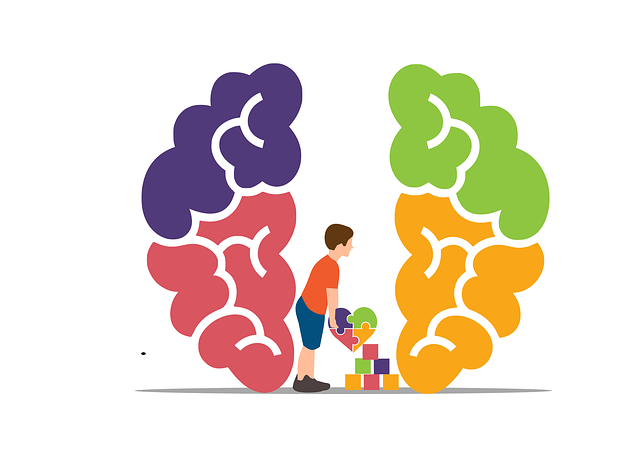Evaluating mental wellness programs for conditions like Boulder Autism Spectrum Disorder (ASD) Therapy requires a multi-faceted approach combining quantitative and qualitative methods. Surveys, medical records, focus groups, and narrative essays measure both objective improvements (e.g., symptom reductions) and subjective experiences (e.g., satisfaction, perceptions of support). Behavioral observations provide tangible evidence of client progress over time, while long-term follow-ups assess the sustainability of treatment effects. This comprehensive evaluation ensures tailored strategies, continuous improvement, and effective support for individuals with ASD.
Mental wellness program evaluations are essential for measuring effectiveness and fostering continuous improvement. This article explores diverse evaluation methods, from quantitative data analysis to qualitative insights, focusing on their application in the context of Boulder Autism Spectrum Disorder Therapy (ASD). We delve into participant feedback surveys that uncover critical program impacts and behavioral observations tracking progress. Additionally, long-term follow-ups are discussed, highlighting the sustainability of these therapeutic interventions.
- Assessing Program Impact: Quantitative and Qualitative Approaches
- Participant Feedback and Satisfaction Surveys: Unlocking Insights
- Behavioral Observations: Capturing Progress in Action
- Long-term Follow-up: Measuring Sustainability of Boulder Autism Spectrum Disorder Therapy
Assessing Program Impact: Quantitative and Qualitative Approaches

Evaluating the impact of mental wellness programs is a multifaceted process that combines both quantitative and qualitative methods. Quantitative assessments typically involve measuring changes in participant demographics through structured surveys, interviews, or medical records before and after program implementation. This data provides concrete metrics on improvements in symptoms related to conditions like Boulder Autism Spectrum Disorder Therapy, offering insights into the program’s effectiveness in managing specific mental health challenges.
Qualitative approaches, on the other hand, delve deeper into participants’ experiences and perceptions by employing methods such as focus groups, semi-structured interviews, or narrative essays. These techniques explore the subjective effects of the programs, shedding light on aspects like enhanced Mental Health Awareness, Depression Prevention, or Burnout Prevention. By combining both quantitative and qualitative data, researchers can gain a comprehensive understanding of program impact, identifying not just changes in numbers but also the lived experiences and personal transformations that underpin them.
Participant Feedback and Satisfaction Surveys: Unlocking Insights

Participant feedback and satisfaction surveys are invaluable tools for evaluating mental wellness programs, offering a direct line to the experiences and perceptions of those who directly benefit from these initiatives. By collecting insights from participants, especially those navigating challenges like Boulder Autism Spectrum Disorder Therapy, program developers can gain crucial insights into the effectiveness and impact of their interventions. These surveys not only assess satisfaction levels but also provide a platform for participants to voice improvements, share challenges, and offer suggestions for enhancement.
This feedback loop is particularly essential in addressing areas such as stress management, conflict resolution techniques, and mental illness stigma reduction efforts. By tapping into the voices of those who have engaged with the program, organizers can tailor their strategies to better support individual needs. Moreover, this data-driven approach enables continuous improvement, ensuring that mental wellness programs evolve to meet the dynamic demands of their participants, ultimately fostering more inclusive and effective support systems.
Behavioral Observations: Capturing Progress in Action

Behavioral observations play a crucial role in evaluating mental wellness programs, especially when tailored for individuals with conditions like Boulder Autism Spectrum Disorder Therapy (ASD). Therapists can systematically document client behaviors during sessions and activities, providing tangible evidence of progress. This method allows for a nuanced understanding of how clients respond to various interventions over time, from improving communication strategies to practicing mindfulness meditation or learning effective mood management techniques.
By observing and recording these behavioral shifts, therapists gain insights into the program’s effectiveness. For instance, changes in social interaction, eye contact, or non-verbal cues can indicate improvements in communication skills. Additionally, reductions in repetitive behaviors or better control over emotions suggest gains in mood regulation. These observations are invaluable for refining treatment plans and ensuring that clients receive the most appropriate and beneficial mental wellness support.
Long-term Follow-up: Measuring Sustainability of Boulder Autism Spectrum Disorder Therapy

Long-term follow-up is a critical aspect of evaluating any mental wellness program, especially for complex conditions like Boulder Autism Spectrum Disorder (ASD). Measuring the sustainability of treatment effects over time provides valuable insights into the program’s effectiveness and its potential to transform lives. By implementing rigorous long-term assessment protocols, researchers can determine if the benefits gained during therapy persist or require periodic reinforcement.
This approach is essential for refining mental wellness coaching programs, including those focused on development, trauma support services, and crisis intervention guidance. Understanding how Boulder ASD Therapy impacts individuals’ daily functioning, social interactions, and overall well-being years after treatment concludes can guide improvements in therapeutic strategies and ensure the program’s longevity in helping clients navigate life’s challenges.
Evaluating mental wellness programs, such as the Boulder Autism Spectrum Disorder Therapy, is a multifaceted process. By combining quantitative data analysis with qualitative insights from participant feedback and behavioral observations, we gain a comprehensive understanding of program impact. Long-term follow-up assessments are crucial to measure the sustainability of these therapies and their lasting effects on individuals’ mental wellness journeys. This multi-pronged approach ensures that programs like Boulder Autism Spectrum Disorder Therapy can continuously improve and better serve those they support.














